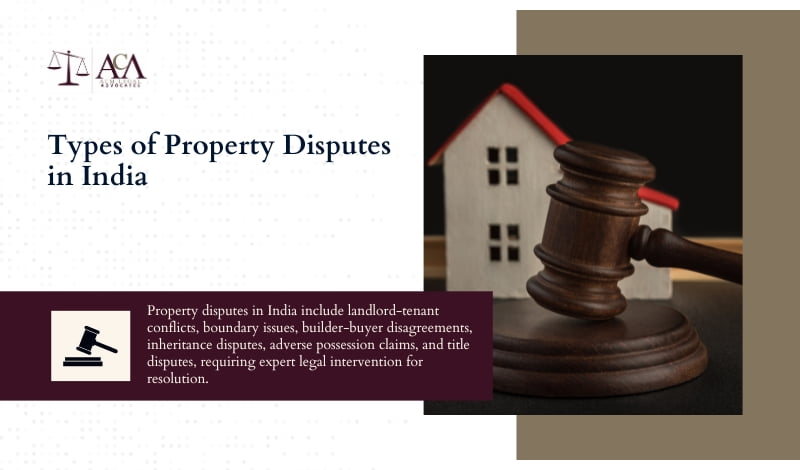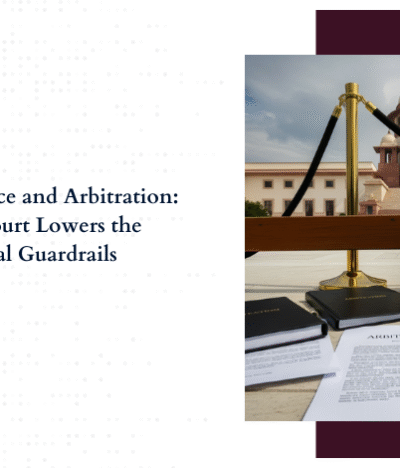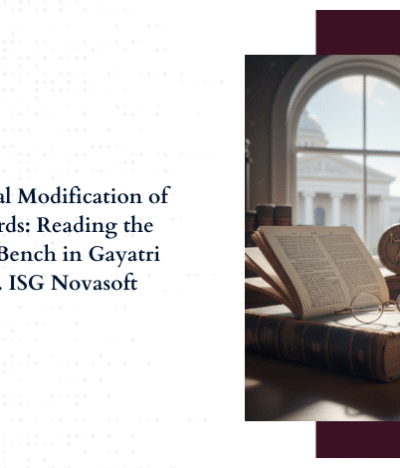What are the disputes related to property? In India, property disputes encompass a broad range of conflicts, reflecting the diverse and intricate nature of property ownership and inheritance. Types of property disputes in India frequently arise from issues such as misuse of leased property, inheritance conflicts among family members and disputes over property boundaries. These disputes not only strain relationships but also involve significant legal complexities, requiring adept legal intervention to resolve effectively.
Types of property disputes in India also include conflicts between builders and buyers, particularly concerning delays in possession or failure to provide necessary certificates. Additionally, issues surrounding inherited or willed properties are common, often leading to prolonged legal battles. Addressing these disputes with a strategic and informed approach is crucial to safeguarding property rights and ensuring fair resolutions.
Types of Property Disputes in India
Types of property disputes encompass a wide range of conflicts arising from various aspects of property ownership and use. These disputes often involve complex legal proceedings and require thorough documentation and legal expertise to resolve. Understanding the nuances of each type can help in effectively managing and mitigating such conflicts.
Landlord-Tenant Disputes
Landlord-tenant disputes are a common type of property dispute in India, often arising from issues such as rent defaults, unauthorized subletting, property damage or eviction procedures. These disputes are primarily governed by the Rent Control Acts specific to each state, which stipulate the rights and obligations of both landlords and tenants. Legal remedies for landlords include filing for eviction, claiming unpaid rent and seeking compensation for property damage. Tenants, on the other hand, are protected against unlawful eviction and have the right to a fair hearing..
Property Boundary Disputes
Property boundary disputes are a significant type of property dispute, typically arising from unclear or inaccurate property boundaries. These disputes often occur between neighbors and involve disagreements over the actual distinction of property lines. Such conflicts can lead to legal battles where each party presents evidence such as property deeds, land surveys and historical records to establish rightful ownership.
Builder-Buyer Disputes
Builder-buyer disputes are a common type of property dispute, often stemming from delays in project completion, substandard construction or failure to deliver promised amenities. These disputes usually arise when builders do not adhere to the terms of the agreement, leaving buyers in financial and emotional distress. The Real Estate (Regulation and Development) Act, 2016 (RERA) provides a regulatory framework to address these issues, offering buyers a platform to file complaints and seek redressal. Legal remedies include refund claims, compensation for delays and enforcement of contractual obligations.
Disputes Over Inherited or Willed Properties
Disputes over inherited or willed properties are a frequent type of property dispute in India. These conflicts arise when there are multiple heirs to a property and disagreements occur over the division or legitimacy of inheritance claims. Under the Indian Succession Act, 1925, Hindu Succession Act, 1956 and other laws personal laws property distribution follows either a will’s directives or the rules of intestate succession if no valid will exists. Such disputes often involve contesting the will’s validity, claims of undue influence or challenging the interpretation of the will’s terms. Ensuring a clear and legally sound will can prevent many of these disputes.
Adverse Possession Disputes
Adverse possession disputes are another type of property dispute in India where an individual claims ownership of property by continuous possession without the legal owner’s consent. Under the Limitation Act, 1963, if a person occupies property openly, continuously and hostilely for a statutory period (typically 12 years), they may claim legal ownership through adverse possession. These disputes often involve presenting evidence of continuous and uninterrupted possession.
Title Disputes
Title disputes are a significant type of property dispute in India, arising when there are conflicting claims over the ownership of a property. These disputes often stem from issues like forged documents, fraudulent transfers, or errors in property records. The Transfer of Property Act, 1882, and the Registration Act, 1908, provide legal frameworks to resolve such disputes, which typically require thorough examination of property deeds, title documents and historical records.
Conclusion
Types of property disputes in India cover a broad spectrum, including landlord-tenant disputes, property boundary conflicts, builder-buyer disagreements, disputes over inherited or willed properties, adverse possession claims, and title disputes. Each type presents unique legal challenges and complexities that necessitate thorough documentation and professional legal intervention. Understanding these disputes and their legal frameworks is essential for effectively managing and resolving property conflicts.
Resolve Your Property Disputes with ACM Legal
The resolution of types of property disputes in India necessitates expert legal advice to navigate the complexities and protect one’s interests. ACM Legal’s extensive experience and expertise in this field ensure that clients receive precise and effective legal solutions tailored to their specific disputes. Choosing ACM Legal as you property dispute lawyers in Delhi, ensures one achieve fair and efficient resolutions, minimizing the emotional and financial strain often associated with property disputes.
FAQs
1. What are the common types of property disputes encountered in India?
The common types of property disputes in India include property boundary disputes, builder-buyer disputes, disputes over inherited or willed properties, disputes between co-owners, adverse possession disputes, landlord-tenant disputes, builder-developer disputes and title disputes. These disputes often arise from unclear property rights, fraudulent documentation or breach of contractual terms.
2. What steps can be taken to avoid inheritance disputes regarding property in India?
To avoid inheritance disputes regarding property in India, it is essential to create a clear and legally sound will, update it regularly to reflect current intentions and ensure transparency among potential heirs. Registering the will with the appropriate legal authorities and seeking professional legal advice can also help prevent conflicts
3. What is the importance of legal documentation in resolving property disputes?
Legal documentation is vital in resolving types of property disputes as it provides evidence of ownership, agreements and transactions. Proper documentation, such as registered sale deeds, wills, lease agreements and property tax receipts, helps establish clear legal rights and obligations, reducing ambiguity and facilitating the resolution of disputes through legal channels.
4. What preventive measures can property owners take to avoid disputes?
Property owners can avoid types of property disputes by conducting due diligence before purchasing property, maintaining clear and updated property documents, regularly inspecting property boundaries and drafting comprehensive agreements for any transactions.
5. What are the advantages of seeking legal counsel for property disputes in India?
Seeking legal counsel from property disputes lawyers in Delhi offers several advantages, including expert guidance on applicable laws and legal frameworks, representation in court or mediation and strategic advice to protect one’s interests. Legal counsel can help navigate complex legal processes, gather and present evidence effectively and negotiate settlements to resolve disputes efficiently.
6. What is the role of mediation in property dispute resolution in India?
Mediation plays a crucial role in resolving types of property disputes in India by offering a less adversarial and more cost-effective alternative to litigation. It involves a neutral third party who facilitates negotiations between the disputing parties to reach a mutually agreeable solution.
7. What legal frameworks apply to disputes over rental properties in India?
Disputes over rental properties in India are governed by the Rent Control Acts specific to each state. These laws outline the rights and obligations of landlords and tenants, including rent regulation, eviction procedures, and maintenance responsibilities.
8. What are the challenges faced in property disputes involving co-owned properties?
Property disputes involving co-owned properties often face challenges such as disagreements over property management, use and profit distribution. Legal challenges include proving individual ownership stakes, interpreting vague agreements and dealing with unwilling co-owners. The Partition Act, 1893 provides a framework for resolving such disputes through partition suits.
9. How do property disputes impact inheritance planning?
Property disputes significantly impact inheritance planning by causing delays, financial strain and emotional stress for the involved parties. Disputes can lead to prolonged legal battles, affecting the smooth transfer of assets to heirs.
10. What are the legal options for expediting the resolution of property disputes in India?
Legal options for expediting the resolution of property disputes in India include pursuing mediation or arbitration for faster and less adversarial outcomes, filing and seeking interim reliefs such as injunctions to prevent further complications. Courts may also fast-track cases involving urgent issues. Proper legal representation by property dispute lawyers in Delhi and comprehensive documentation can significantly speed up the resolution process.






